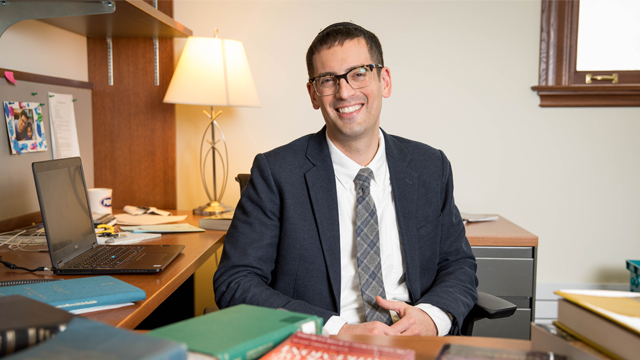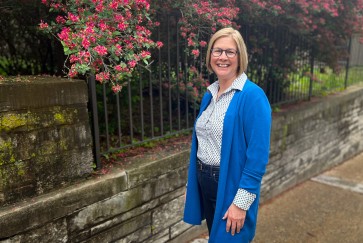“If you tell Jewish history without being attentive to developments in Christian society, Islamic culture, and all sorts of other historical dimensions, you are only getting a fraction of the story.”
David Shyovitz grew up in an observant Jewish family, and initially considered becoming a rabbi. But after taking Jewish history courses in college, he realized he had even more to learn about his faith.
“In my formative religious education, I was taught that Jewish communities’ exposure to Christians and Muslims was mostly limited to episodes of violence and persecution,” Shyovitz says. “But the more I learned and read, the clearer it became that many Jewish beliefs and practices that I had thought of ahistorically were in fact profoundly shaped by encounters with broader religious cultures. Pretty shortly after being exposed to that as an undergrad I realized I wanted to pursue academia, and luckily I’ve been able to.”
Now as a Northwestern professor, Shyovitz’s research focuses on medieval European intellectual and cultural history, with a particular emphasis on Jewish history and Jewish-Christian relations.
Shyovitz holds dual appointments in History and Jewish Studies, and he says the two areas inform — even depend — on each other. Much like his research looks at religion through a historical lens, Shyovitz tries to bridge the two fields as much as possible in his classes.
“I think you can’t make sense of the dynamics of Jewish history unless you understand the broader historical settings in which Jews lived.”
His upcoming book, "Oh Beastly Jew!" Jews, Animals, and Jewish Animals in the Middle Ages, delves into the overlapping ways in which animals were distinguished from humans by Jewish and Christian authors and artists during the Middle Ages.
“Many medieval Christians made a concerted effort to ‘dehumanize’ Jews by comparing them to animals, or by claiming that they were fundamentally ‘beastly,’” Shyovitz says. “But what I’ve found is that some Jewish authors responded by going out of their way to blur the distinction between humans and animals, and portraying the Jewish people as animalistic in a positive way. To me, it’s a fascinating example of how religious communities shape their identities in opposition to one another, in surprising and paradoxical ways.”
Mirroring his own experience, Shyovitz exposes his students to history that is sometimes incongruous with their earlier education or understanding. His goal is to equip students with the tools to understand issues and make decisions.
“My job is to put the information out there,” he says. “And if students want to speak with me after class, or discuss what the information means for their identity, my door is open. And if they want to draw strict lines between history and their religious identity, that’s up to them.”


